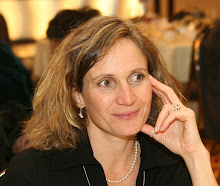This first blog gives some details about the Information Systems Elective course I'm teaching this term. I hope a lot of students from different backgrounds sign up. Hopefully, this post will help excite them about what we'll be learning.
First some background about me: My name is Kelly Lyons; I am joining FIS as a new faculty member in January 2008. Until recently, I was the Program Director of the Centre for Advanced Studies (CAS) at the IBM Toronto Lab. CAS works with university researchers on collaborative research project with IBM. So, I am coming from an industry background but with experience working with graduate students and faculty members on research projects.
So, there is a strong desire among many academics to work in this new, emerging, barely-defined field of study, or actually a somewhat loosely coupled combination of fields of study.
One of the things that attracted me to Service Science is the fact that it brings different areas together: social and cultural issues, computer science / information technology, management, operations, and so on. There is a unique opportunity in FIS to make progress and contributions that will bring these together into a more multidisciplinary area of study. That’s one of the goals of the course and my research program.
So, what is service science: the application of scientific, management, and engineering principles to services. A “service” is something that an organization or individual beneficially performs for and with another. In fact, researchers can’t 100% agree on how to define services. One of the things we’ll do is apply different theories of services to various service activities students are involved in.
One thing that is common among definitions is that services depend critically on people, and co-creation of value … and in this course we will focus on those services that also depend on technology and information. In order to deliver services, people work together and with technology to provide value.
Another way to look at services is through service systems. Service systems involve the interaction of people, technology, information within and external to organizations. Building services systems requires being able to model the many interactions and relationships. The paper here by Jim Spohrer, Paul Maglio, John Bailey, and Daniel Gruhl titled "Steps Toward a Science of Service Systems" does a nice job of describing different kinds of service systems and their complexities.
In my opinion and that of many of my colleagues, it’s important to look at service science from different perspectives and to agree on a common “language” or frame of reference. For example, in a recent workshop I helped organize, we talked about possibly having researchers from different backgrounds read the same papers in the area and annotate them from their perspective and use the different annotations to help come up with a common frame of reference. This is one of the things we will try to do in this course.
Since I come from a Computer Science background, I’ll present the course from that perspective but I’m very excited to have other points of view and perspectives from individuals participating in the course. I’m especially interested in understanding how to exploit social computing technologies and tools to better provide communication, collaboration, and innovation (unique, new ways of doing things) in service systems.
So, the course is broken into 4 topic sections, each with readings and assignments, plus a final paper and presentation:
- Introduction to Service Science: Defining services, service systems, applying theories of services to student-selected service activities.
- Modeling, analyzing, and optimizing service systems (of students' choice – hopefully related to their specialty) using software modeling tools (specifically WebSphere Business Process Modeler)
- Innovation in services: What new ways of doing things or new models could be used to enhance the chosen service system? We will look at some case studies as examples.
- Service Oriented Architectures: How are SOA technologies and associated tools helping organizations modify the software that implements their service system
Because of the uniqueness of the topic, we need to look at innovative delivery methods for the material and ideas presented. Guest lecturers will provide practical perspectives that we can compare with and augment what’s being learned through review of academic papers. We will also explore different social computing environments for sharing knowledge, information, and expressing our ideas: wiki’s, blogs, and through virtual world avatars.
I’ve been familiar with and involved in research in services science with the goal of making companies (like IBM where I come from) more profitable in their services business (or for IBM to help make their customers more profitable), BUT it is clear to me that service science research can benefit social services and non-profit entities as well … and we have a real opportunity through this course and within FIS to be quite unique in our approach to studying service systems such as libraries, public institutions, social services, hospitals, high schools, universities, etc. That is one thing I hope we can bring to this topic and through each of the different perspectives in FIS and some of the other topics each of you are studying.

3 comments:
Hey! Great start. If you're letting the readership direct the content, I'd like to see a mix of: stuff about moving from private-to-public (industry-to-academia); SSME; and personal thoughts on life as an academic (teaching, research, etc.)
Ooh, cool, you're blogging! Adding you to my reader...
Thanks, Stephen and Sacha for your continued encouragement.
Is there a nice way for me to categorize the different topics you suggest?
Thanks for reading it and providing feedback! -- Kelly
Post a Comment